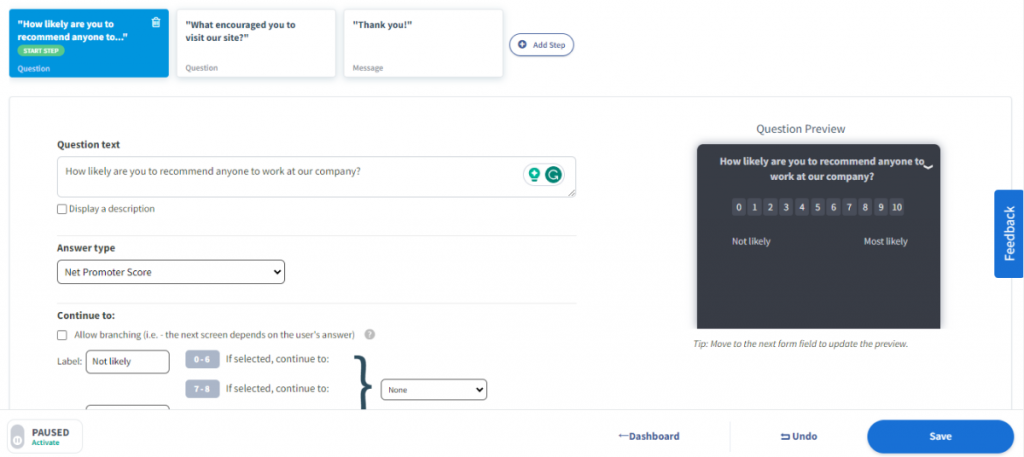You might have heard of Optimal Workshop when looking for a UX research platform to create and run online surveys and perform card sorting and tree testing.
It’s a popular tool that many UX designers and researchers use to get user insights and improve products and experiences.
But if you’re looking for better pricing and more features focused on direct user feedback, there are several Optimal Workshop alternatives that can provide you with more value and better results.
In fact, I’ve personally tested and reviewed 8 of the best Optimal Workshop competitors that you can try in 2026.
Discover the Best Optimal Workshop Alternatives in 2026
I have curated a list of the top 8 Optimal Workshop alternatives in 2026 based on my hands-on experience with each tool to provide you with the best options available in the market. You can check out my selection criteria below after the list.
1. Qualaroo: Best for Collecting Contextual Feedback

Qualaroo is an excellent survey-based UX research tool I frequently use to collect contextual feedback from my website visitors. It offers advanced features like behavior targeting, smart triggers, and branching logic to target niche user actions and behavior to display the survey to the right people at the right time.
I often use this Optimal Workshop competitor for prototype testing. I integrate Qualaroo survey Nudges™ into my design templates like AdobeXD and InVision to collect targeted feedback from users, stakeholders, and other team members.
The tool works perfectly on websites, mobile apps, and products to gauge unaltered user experience with focused surveys.
Check out this video to learn how to leverage Qualaroo Nudges™ to collect in-context feedback.
What you’ll like:
- A detailed reporting section with multiple filters to craft custom reports.
- AI-powered sentiment analysis to capture user sentiments in real time.
- Advanced targeting options to reach your desired audience.
- Leverage survey branding, skip logic, and a vast template library to design targeted surveys.
- Seamless integration with industry-leading tools like Salesforce, Intercom, and Slack.
- Support for 70+ languages.
- Multiple survey types, such as NPS, CSAT, CES, and Exit-intent, among others.
What you won’t like:
- Although not so often, the survey preview loads slowly.
- A consolidated report for a survey in different languages will be a plus.
Pricing: A FOREVER-free plan is available with all premium features. Starts at $19.99/month.
2. UserTesting: Best for Conducting User Research With Surveys

I enjoyed using UserTesting because it helped me conduct surveys during usability testing. I was able to uncover patterns, capture background information, and even quantify usability insights.
UserTesting seamlessly integrated surveys into the research process so I could gather relevant data to enhance my usability research outcomes.
The best part was that I had access to a massive network of contributors from UserTesting who were ready to participate in my survey. I filtered the right users for my target audience based on criteria like age, gender, location, income, etc.
I also asked them follow-up questions to get feedback in their own words. This platform gave me the insights to create a better customer experience.
What you’ll like:
- Editable video feedback clips to create highlight reels to analyze the data.
- Advanced demographic filters to reach only qualified participants.
- Screen recording so users can leave feedback amid the test.
- Ready-to-use usability test templates to get you started instantly.
- Multiple usability tests like navigation, five-second, first impression, tree, etc.
What you won’t like:
- Demographic filters can be overwhelming for new users.
- The dashboard UI is dated.
Pricing: Starts at $10,000 – $15,000 annually (estimated pricing). Contact UserTesting for a custom quote.
3. Userlytics: Best for Creating a Personalized User Experience

I used this tool to customize surveys based on their responses or actions.
With Userlytics‘ branching logic tool, I could tailor subsequent questions based on specific conditions or criteria, which made the customer experience personalized and relevant.
This platform allowed me to create a more efficient and targeted data collection process, improving the accuracy and relevance of my research findings.
This Optimal Workshop alternative also helped me discover some usability issues and user feedback I would have missed otherwise. I used these insights to improve my landing page design, copy, and offer.
What you’ll like:
- Besides surveys, it’s also known for tree testing, prototype testing, usability testing, and card sorting.
- In-depth targeting options to find the right participants.
- Picture-in-picture (PIP) recording to monitor participants in real time.
- Participant panel to test your products and prototypes and conduct surveys with highly qualified and engaged participants.
- Built-in analytics tool to get detailed metrics on NPS and make data-driven decisions.
What you won’t like:
- Individual company accounts require separate panel credits.
- Pricing is not suitable for small businesses.
Pricing: Starts at $3500/year.
4. UXArmy: Conducting Survey With Images

If you’re searching for a tool that goes beyond the ordinary and seamlessly combines the power of surveys with the richness of images, UXArmy is the perfect solution.
I have used UXArmy to conduct surveys with images and let me tell you, the impact on the depth of insights was phenomenal. Adding multiple images within a survey question allowed me to analyze the user experience layer by layer.
One of the things I loved about UXArmy was the flexibility to tailor the layout, size, and shape of the images, ensuring a seamless integration into my surveys. You can upload up to 10 images per survey and choose the order of presentation.
What you’ll like:
- Custom design options to align feedback with your business goals and objectives.
- Multiple question types to gain deeper insights into user preferences and opinions.
- User segmentation to target specific user groups to gather targeted feedback.
- Real-time analytics to track the success of your survey campaign and make adjustments as needed.
- Quick turnaround time to gain valuable insights and make informed decisions quickly.
What you won’t like:
- The quality of the testers varies. They sometimes provide low-quality feedback.
- No option to pinch or zoom the static images and screenshots.
Pricing: Custom Pricing.
5. Useberry: Best for Gathering Self-Reported User Data

A colleague recommended Useberry as an online survey tool for collecting self-reported data on my website users’ needs, opinions, and attitudes. Intrigued, I decided to try it.
Using Useberry was easy. I selected questions from various question types, such as Multiple Choice, Opinion Scale, Short Text, Likert Scale, SUS, and Demographics.
This popular Optimal Workshop competitor helped me ask my users questions about their needs, opinions, and attitudes regarding my website’s design, content, and functionality. I also used logic branching to show different questions based on the user’s previous answers.
Within hours, I received hundreds of responses.
What you’ll like:
- Professionally designed survey templates to get you started with confidence.
- Advanced targeting options to segment specific user groups.
- SUS survey to assess the usability of your designs and compare them to industry benchmarks.
- Short text questions surveys to get a more comprehensive understanding of user experiences.
- In-depth data analysis to identify trends and patterns among users.
What you won’t like:
- Limited integrations with other software and tools.
- The analysis and reporting tool is not very advanced.
Pricing: Starts at $67/month.
6. PlaybookUX: Best for Scalable Quantitative Research Surveys

Image Source: TrustRadius
My friend, who runs a successful e-commerce website, has been using PlaybookUX for a while and is very happy with the results.
According to her, PlaybookUX has many features that make her research process faster and more efficient. She created a survey and customized it using various question types to meet her specific research objectives.
She defined her target audience to achieve scalability, ensuring it was broad enough to gather substantial responses but still relevant to her research goals.
PlaybookUX’s robust platform handled the scalability effortlessly by collecting data from many participants within a relatively short time frame.
She could see the quantitative data, such as completion rate, average time to complete the survey, and satisfaction score, and analyze her survey results using PlaybookUX’s powerful analytics tools.
What you’ll like:
- Open-ended and closed-ended questions to gather rich quantitative insights.
- Personalized welcome page and end page of surveys to give it a personal touch.
- Participant panel to recruit and test participants for surveys.
- Predefined audience criteria for future surveys to help you save time during project setup.
- In-depth analytics to quickly analyze survey results with charts and graphs.
- Skip logic to allow participants to skip irrelevant questions.
What you won’t like:
- The platform’s selection of available tests is relatively limited.
- The UI is not very intuitive. New users might take some time to navigate the tool.
Pricing: Starts at $267/month.
7. Proven By Users: Best for User Testing Surveys in UX Research

Image Source: Proven By Users
I tried Proven By Users‘ free plan for conducting a user testing survey. I used it to test the prototype of a landing page I had designed for a new product. I added multiple-choice questions to gauge users’ interest, understanding, and feedback.
Proven By Users is a strong Optimal Workshop competitor. It helped me find and recruit users who fit my criteria and collect and analyze their responses. I could easily monitor the progress of my survey online and see the results on my dashboard.
This survey gave me valuable insights into how users perceived my landing page. I could view the summary of the responses on my dashboard.
What you’ll like:
- Targeting option to reach a large audience at scale.
- In-built analytics tool to spot trends and patterns within the data collected.
- 5-second test to understand what users remember with a memory test.
- Tree testing to evaluate your navigation against real-world tasks.
What you won’t like:
- Limited integration options.
- Limited targeting options to collect global data.
Pricing: Starts at $49.95/month.
8. Pendo: Best for Launching Targeted In-App Surveys

Image Source: Pendo
Pendo is one of the best Optimal Workshop alternatives I have used for launching targeted in-app surveys. It lets me segment my users based on their behavior and feedback and deliver relevant and timely surveys for each segment.
I could even customize the look and feel of my surveys to match my brand and product. Pendo helped me get higher response rates and more actionable insights from my users. I utilized those insights to improve my in-app experience and user satisfaction.
What you’ll like:
- In-app guidance to facilitate a seamless onboarding experience.
- Session replays to gain valuable insights into user interactions within applications.
- Target users at the right to increase mobile app ratings.
- Quantitative analytics to make data-driven decisions using real metrics.
- Advanced customization to tailor insights to specific customer segments.
- Easy integration with popular CRMs such as HubSpot for automated processes.
What you won’t like:
- Limited design options make it challenging to provide a seamless user experience.
- The pricing is not straightforward.
Pricing: Custom Pricing.
My Selection Criteria
The evaluation of products or tools chosen for this article follows an unbiased, systematic approach that ensures a fair, insightful, and well-rounded review. This method employs six key factors:
User Reviews / Ratings
Direct experiences from users, including ratings and feedback from reputable sites such as G2 and Capterra, provide a ground-level perspective. This feedback is critical in understanding overall satisfaction and potential problems.
Essential Features & Functionality
The value of a product is ascertained by its core features and overall functionality. Through an in-depth exploration of these aspects, the practical usefulness and effectiveness of the tools are carefully evaluated.
Ease of Use
The user-friendliness of a product or service is assessed, focusing on the design, interface, and navigation. This ensures a positive experience for users of all levels of expertise.
Customer Support
The quality of customer support is examined, taking into account its efficiency and how well it supports users in different phases – setting up, addressing concerns, and resolving operational issues.
Value for Money
Value for money is evaluated by comparing the quality, performance, and features. The goal is to help the reader understand whether they would be getting their money’s worth.
Personal Experience/Expert’s Opinion or Favorites
This part of the evaluation criteria draws insightful observations from the personal experience of the writer and the opinions of industry experts.
Which Is The Best Optimal Workshop Alternative?
You’ve just learned about the top 8 Optimal Workshop alternatives in 2026. But which one should you choose? To help you decide, I’ve narrowed down the list to my top 3 recommendations:
Option A: Qualaroo
Qualaroo is a great tool for collecting contextual feedback from website visitors. It offers advanced targeting options like conditional logic and intelligent triggers and integrates well with templates and prototypes in design tools like Adobe XD.
Option B: UserTesting
UserTesting provides fast and real-time customer insights through various survey types. It has a vast contributor network that you can filter and recruit for your survey. You can ask follow-up questions and get feedback directly from users.
Option C: UXArmy
UXArmy is the best survey tool for analyzing user experience with images. It allows you to add multiple images within a survey question and customize their layout, size, and shape.
If I had to pick one tool that stands out from the rest, it would be Option A. Qualaroo is the tool I use the most for my user research projects. I can vouch for its effectiveness, reliability, and ease of use.
FREE. All Features. FOREVER!
Try our Forever FREE account with all premium features!

 We'd love your feedback!
We'd love your feedback! Thanks for your feedback!
Thanks for your feedback!







